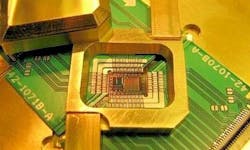Advances in quantum computing is goal of Lockheed Martin-University of Maryland partnership
Quantum computing offers greater power than traditional digital computers, and a different way of solving problems. This new technology may come to bear on solving some of the most challenging problems, and could kick-start a near era in supercomputer development.
Lockheed Martin and the University of Maryland are working together to establish the Quantum Engineering Center, which will be located at the University of Maryland's College Park campus.
“Classical computing can only take us so far,” says Dr. Ray O. Johnson, chief technology officer at Lockheed Martin. “In the future, critical systems will become so complex that problems will take too long or become too expensive to solve using even our most powerful supercomputers. We believe the next computational revolution will stem from applied quantum science—a discipline that connects physics, information science, and engineering.”
Related: From theory to reality: quantum computing enters the defense industry
Lockheed Martin is among the U.S. defense contractors taking a leading role in developing quantum computing technology for aerospace and military applications.
Quantum computing is based on quantum mechanics, which involves the behavior of subatomic particles called quantum particles. This can enable a quantum computer to use data bits differently from conventional digital computers. While today's computers use bits that exist as ones or zeroes, quantum computing uses quantum bits, or qubits, that can be zero, one, or any superposition of the two states at the same time.
The ability for a qubit to exist in several different states at the same time gives it a massive edge when it comes to parallel processing. Conventional computers process information sequentially, while a quantum computer processes information in parallel because its data exists in several states.
The University of Maryland will transform the study of quantum mechanics into the practice of quantum engineering through its partnership with Lockheed Martin, says Mary Ann Rankin, senior vice president and provost of the University of Maryland at College Park.
Related: Army launches program to advance quantum computing techniques for parallel processing
The initial goal of the Quantum Engineering Center is to demonstrate a quantum computer with reliable, well-characterized operation without requiring a user to have a deep understanding of the internal workings of the system—just like conventional computers work today.
“In the case of quantum components, it’s like we’re back in 1947 working with the first semiconductor transistors,” says Chris Monroe, Bice Zorn professor of physics at the University of Maryland.
“We are talking about unusual systems -- specially tuned laser and microwave fields trained with exquisite precision onto individual atoms suspended with electrical fields and immersed in a vacuum chamber a million times less dense than outer space,"Monroe says. "Each aspect is challenging in its own way, but we understand exactly how every piece works. Our focus now is integrating these systems to consistently and reliably work in harmony, much like engineering a complex aircraft, so that the device is more than just a sum of its parts.”
For more information contact Lockheed Martin online at www.lockheedmartin.com, or University of Maryland at www.umd.edu.
